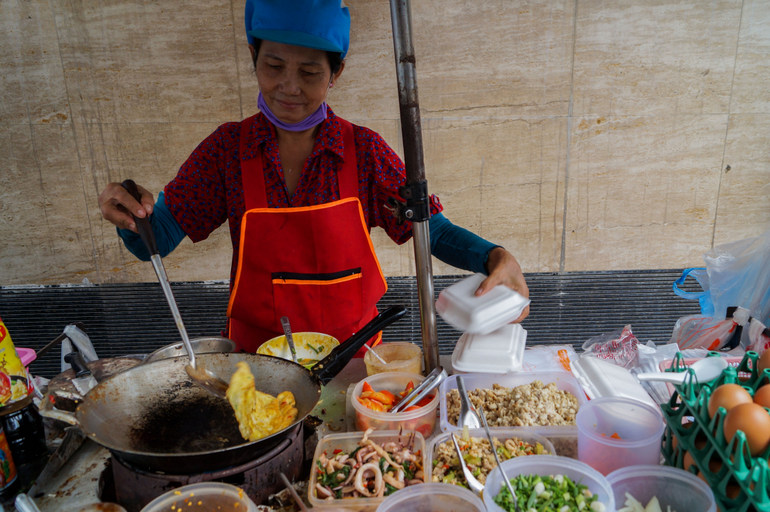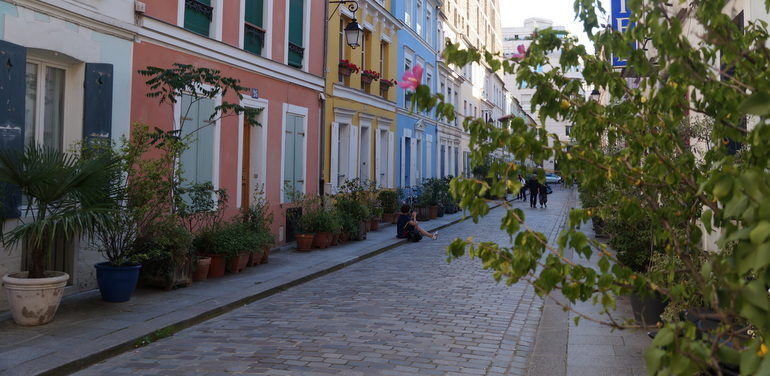The streets called to us at breakfast. Despite the early hour the sticky heat smacked my skin as we left our hotel. Sukhumvit was bustling – cars, buses, motorbikes and tuk tuks competed on the main road. The late-night massage parlour, where my feet had been pummeled the night before, was still closed.
Our search for food drew us down Soi 23 where power lines hung low and street vendors, shaded by big bright umbrellas, hogged the sidewalk. We spoke over the crass roar of motorbikes as we decided to explore – encouraged by the people crowding the stalls.
I had been in Bangkok two days but had avoided the street food. I feared my stomach, accustomed to routine, would revolt.

We found her that Thursday morning, after passing vendors cooking from their makeshift kitchens on wheels. I looked anxiously at the meat and seafood exposed to the heat. Doug googled the Thai word for vegetarian.
She was set up next to a vendor selling flavoured iced drinks. Several trays of eggs were stacked neatly in a corner of her stall, which was crammed with plastic containers holding chopped onion, chilli, carrot and tomato. We watched quietly from the side as she cracked eggs into a green plastic bowl, tossed in the ingredients, and poured the mixture into a sizzling wok. She expertly flipped the omelette while whisking the next order, and taking the one after that.
Whisk, pour, flip – it went on uninterrupted. There was little chatter with customers, rarely a smile. I wondered how many she had cooked in her life.
We moved onto the road to stand in front of her stall. She held up her fingers as she pointed to the neat stack of eggs. “One? Two?” she asked with her gestures, looking at us from under her blue peaked hat. We answered quickly, adding “mangswirati” so she would spare us the seafood mixture sitting in a tub next to the wok. She nodded and repeated it back. “Mangswirati,” dragging out the last syllable. She pointed at the ingredients. I nodded at the onion, diced carrot and spring onion, but shook my head fiercely when she hovered over the chilli. I got my first smile.
A man came over and stood behind the stall. “Where are you from?” he asked in English. “Australia,” we said. The only thing he or our cook would ever know about us or our lives.
When my breakfast was cooked she pulled out a white Styrofoam container filled with rice and plopped the steaming omelette on top. She hadn’t even closed the lid before pouring more oil into the work, ready for the next one. She held up a plastic unmarked bottle of sauce, getting my approval before drizzling it over my breakfast. Then she held up notes from a pink plastic basket to tell us how much we owed. We handed over 100 baht and received back 60. Our meals cost less than one dollar each. We said “thank you” in terrible Thai before sitting on a concrete bench under a tree to eat.
On Friday we were in a rush to get to our conference as we walked down Soi 23. There was a flash of recognition in her eyes, or maybe surprise, when she saw us. Was there a hint of a smile before she carried on whisking, pouring and flipping? We took our position on the road in front of her stall, probably getting in the way of traffic. Her other customers stood on the sidewalk, leaning on a wall and waiting for their breakfast, but I liked to watch her at work.
She wore the same blue cap but the bright shirt from yesterday had changed to dark red checks. A long sleeve top covered her arms underneath. Her eyes darted all over – to her customers as they ordered or put money in the pink basket; to the commotion down the street or a motorbike whizzing by; to the bubbling egg mixture in the wok, or at the next egg as she cracked it with a knife.
I couldn’t tell how old she was. How long had she been doing this? Why did she start? Did she have a family? Where did she live? I had so many questions.
We were braver, or at least Doug was, and he tried to ask for meat in his omelette, but after yesterday we were familiar and she prepared two vegetarian servings. I didn’t know this until after our trip, but the dish was kai jeow, a popular Thai breakfast omelette usually stuffed with minced pork. We were most likely missing out on the best part the whole time. When it came time to pay she quickly consulted another customer before proudly saying “25, 30” in English as she pointed to each of us.
On Saturday we greeted her with a bold hello in Thai as we took our usual spot. There was a legitimate smile, as if she was as happy to see us as we were to see her. We became more comfortable each day. She didn’t pour the pink sauce on top anymore, we did it ourselves. When it was time to pay we put the coins in the basket without prompting.
While my omelette cooked and she whisked another order in her green bowl, she leaned over to speak quietly to another customer, a young woman in a pink T-shirt and a white mask around her neck.
Our cook repeated something softly, turned back to us, and looked at me furtively. She smiled and pointed her finger in my direction. And then she said “beautiful”.
She pointed at Doug. “Beautiful.”
Stretching her arm over the sizzling wok and chopped chili and chicken she gestured at my pale, freckled arm, and back at her dark skin. “Beautiful,” she said again.
I clasped my hands on my chest and beamed. Her smile widened and we all laughed, including her other customers.
There was so much I longed to say. To ask. I wanted to explain that in my country my pale skin was not considered attractive. I wanted to express my gratitude for her becoming a familiar and friendly face in a city so foreign. I wanted to hear her story – how she came to be standing behind that stall in this street.
But all I could do was bow my head and say ‘kop kun kha’. Thank you.
On Sunday I walked with more confidence straight to her stall. “Sa wa dee kha,” I said to greet her, drawing out the ‘kha’ to replicate how I’d heard the Thai women speak. Her cap was green, her shirt covered with blue, red, yellow and white polkadots. She scrubbed the wok with a wad of steel wool tied to a wooden handle, before tipping in some oil to start the next order.
As she pulled out rice-filled containers, she found one big serving and one small. Holding up the bigger serving she pointed at Doug, looked him up and down and indicated it was for him. I got her meaning. “Yes, he eats a lot,” I said in English, even though she couldn’t understand.
Thai is a tonal language. The way you pronounce a word can change its meaning. I kept this in mind when, after receiving my breakfast, I had the opportunity to share the latest addition to my Thai vocabulary. I met the gaze of our cook, gestured in her direction and smiled. And then I said “sŭai”.
Said with a rising tone “sŭai” means beautiful in Thai. Said with a mid tone (suai) it means unlucky. Judging from the smile on her face, I got it right.
On Monday, our last morning near Sukhumvit, we left our posh hotel once again in search of food. Visiting our breakfast lady had become something to look forward to every day. A series of brief, yet colourful, interactions to treasure from our time in Bangkok. We were to leave the city early the next day from another hotel and I wondered how to communicate to her that this would be our last visit. A photo of the three of us, I thought, would be a nice memento.
We turned down Soi 23 into a strangely quiet and empty street. A lone street vendor stood under a big umbrella in the distance. We had been warned Mondays could be quiet because the government had declared designated days for street sweeping.
Our breakfast lady was having a day off.






2 Comments
Such a lovely article – and beautifully written. Reminds me of our breakfast experiences in Bangkok – we abandoned the attempt at poached eggs in the hotel and instead made for a street stall, packed with locals, for spicy noodles and weak black tea. They always welcomed us warmly. Similar in Hong Kong where the owner would rush out when he heard our attempted “saam cha sui bao, m’goy” every day (1 for me, 2 for Pork Belly). They never cost the same two days running, but we didn’t care!
Thank you Rosemary. Isn’t it wonderful that connections with people such as the owner in Hong Kong can be made in a such a short space of time. It really is something to treasure.